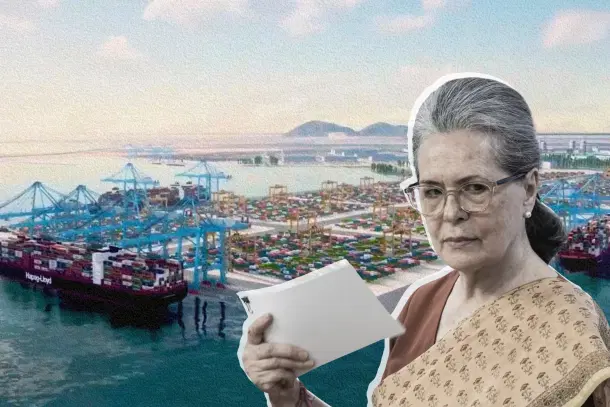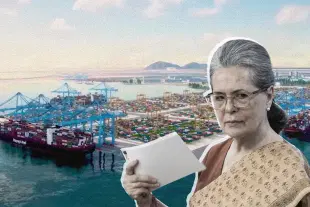Infrastructure
Nicobar Project: Sonia Gandhi’s Environmental Absolutism Betrays India’s Economic And Strategic Needs
Prakhar Gupta
Sep 08, 2025, 02:51 PM | Updated Oct 09, 2025, 09:03 AM IST
Save & read from anywhere!
Bookmark stories for easy access on any device or the Swarajya app.


Sonia Gandhi’s column on the Great Nicobar project reads like a moral absolution. Development equals sin. Conservation equals the sacred. Anyone who suggests a middle ground is cast as a villain. That framing is not only lazy, it is dangerous. Nations do not get the luxury of perfect options. They must balance. They must choose mixes of growth and protection that secure livelihoods, sovereignty, and ecosystems together.
The real test of seriousness about tribes and forests is not to oppose every project. It is to ask this question. After development, will there remain enough forest and habitat, and will tribal communities retain the land, resources, and institutions they need to survive and thrive? On the evidence in this case, the answer is yes.
The Great Nicobar project, as legally constrained and judicially supervised, aims to leave viable habitats and guarantees for tribals while delivering strategic and economic benefits the country cannot forgo. Sonia Gandhi’s refusal to accept that trade-off is not principled purity. It’s about looking virtuous.
Start with the central unavoidable point. Some land will be taken and some trees will be felled. That is not in dispute. The real question is whether what remains will be sufficient for the ecosystem and the people who depend on it.
The government’s position, repeated in Parliament, is clear. The Great Nicobar plan will not forcibly displace tribal families and will proceed under legal safeguards and expert scrutiny. Tribal Affairs Minister Jual Oram told the Rajya Sabha that not a single tribal is being displaced. The government has repeatedly insisted that Gram Sabhas were consulted and that mitigation plans will be implemented. That official baseline matters. It is the first line of evidence.
Moreover, oversight is not absent. The National Green Tribunal ordered a High Powered Committee to revisit environmental clearances for the mega project. The ministry then submitted the committee’s report to the NGT in a sealed envelope. That is a sign of judicial process, not conspiracy. If the committee or the tribunal finds mitigation insufficient or consultations flawed, the law provides remedies. Recalibration or cancellation is available. That is how a mature polity reconciles competing goods.
Some part of the forest will go. The operative question is binary. Will enough forest and habitat remain to sustain the island’s ecology and the tribes’ way of life? The answer must be grounded in science and enforceable law, not rhetorical storms.
From the record so far, the project has passed scrutiny to receive environmental clearance. Where doubts have been raised, they have been routed to the courts and committees. That process is messy and imperfect, as with every major infrastructure project is anywhere in the world. Messy due process is preferable to the cruelty of inaction, which leaves communities poor and the country strategically exposed.
The alternative Sonia Gandhi’s veto implies is stark. To indefinitely block the Nicobar plan is to consign the island to stagnation. It allows foreign transshipment hubs to continue extracting value from Indian trade, leaves India strategically thin at a crucial maritime choke point, keeps tribes economically marginal, and withholds jobs, hospitals, and schools that structured development could deliver. Claiming purity while tolerating these outcomes is moral exhibitionism, not courage.
If there is doubt about India’s right and duty to balance, consider the political history Sonia Gandhi declines to mention. The Congress years were not a model of cautious, principled environmentalism. They were, in many crucial episodes, a record of paralysis and politicisation that cost the nation dearly.
The Comptroller and Auditor General’s performance audit of the environmental clearance process is hard to spiritualise. It found systemic delays at multiple stages. Statutory timelines were routinely breached, and the backlog ballooned. Many infrastructure projects were delayed or shelved due to clearance delays.
The CAG showed that projects were held up for months and years, not because the country had reached perfection, but because approvals had become instruments of obstruction. Those delays cost jobs, investment, and strategic capacity.
The political scandal shorthand for this malaise is well known. The phrase 'Jayanthi tax' entered political discourse for a reason. Allegations arose that approvals in the Environment Ministry under Jayanthi Natarajan had become discretionary and susceptible to influence. Public confidence in the fairness and speed of clearances collapsed, and investors reacted accordingly. Accusations of favouritism and controversies turned environmental scrutiny into a tool for delay, not better conservation.
All of this happened under Sonia Gandhi's watch.
Do not mistake this history for an anti-environment argument. It is the opposite. Using due process as a political cudgel hollowed out the authority of genuine environmental protection. Conservation needs credibility. When rules are used to kill development arbitrarily, the public grows cynical. Conservation then looks like obstruction, not stewardship.
Credit the Hindu ethos for ensuring that, unlike what could have happened due to Congress’ misuse of environmental laws, this cynicism did not take root among the public. That cynicism is the real enemy of forests and tribes because it erodes political will to enforce meaningful, technically robust mitigation, precisely the measures Sonia Gandhi says she wants.
We must also confront the ugly way tribal rights were sometimes weaponised for short-term politics. Too often rights rhetoric was used as a veto, not to advance local welfare, but to signal opposition. Protecting a vote bank often trumped improving health, education, and livelihoods that could genuinely empower tribal communities.
A striking example is Operation Green Hunt, aimed at curbing Naxal violence that preyed on tribal populations. P Chidambaram, then Home Minister, faced sharp criticism from Sonia Gandhi’s close aides, including Digvijay Singh, even though the operation sought to safeguard the very tribes whose welfare she now claims to champion. Political calculations often trumped the need for security and development.
The result was perverse. Promises of protection in headlines were followed by continued deprivation on the ground. The absence of integrated state presence, such as roads, schools, and health centres, made tribal communities more vulnerable to exploitation and insurgent predators who capitalised on governance vacuums.
To see why this project matters strategically, one must step back from the forest canopy and look at the map. Great Nicobar is not just a biodiversity reserve or a tribal homeland. It is also one of the most strategic pieces of real estate on the planet.
The island’s southern tip lies at the mouth of the Malacca Strait, the artery through which much of the world’s trade and energy flows. Other ingress points into the Indian Ocean, such as the Lombok and Sunda Straits, used by both commercial shipping and Chinese warships, are also not far away. Yet, for decades, India has allowed foreign ports like Colombo, Singapore and Klang to capture the bulk of this traffic.
Nearly 75 percent of India’s transshipment cargo moves abroad, costing the nation upwards of $200 million annually, not including lost opportunities of transshipment from neighbouring Bangladesh and Myanmar.
Great Nicobar changes that equation. With draft depths of around 20 meters, it can accommodate the new generation of large container vessels that most Indian ports currently cannot. Its location, less than a hour from the main East-West shipping corridor, gives it a locational advantage few ports can match.
A transshipment hub here is not just about moving containers. It is about reclaiming economic sovereignty, creating a logistics ecosystem, generating thousands of jobs, and stimulating ancillary industries such as warehousing, repair, and ship maintenance.
The economic rationale is inseparable from the strategic imperative. Great Nicobar hosts INS Baaz, India’s southernmost air station, which is being upgraded to support long-range P-8I maritime patrol aircraft. In recent years, Chinese submarines and survey vessels have been increasingly active near the Nicobars, mapping the Ninety East Ridge and preparing for sustained presence in the Indian Ocean.
By establishing a deep-draft port, India anchors both civilian and military infrastructure, enhancing surveillance, rapid deployment, and crisis response. A thriving economic hub strengthens the ability to maintain that presence without appearing overtly militarised.
Mineral resources further reinforce the case. Offshore blocks near Great Nicobar hold polymetallic nodules rich in nickel, cobalt, copper, and manganese, essential for electric vehicles and green energy technologies. By integrating mineral extraction with port-led economic development, India simultaneously secures strategic resources, reduces import dependence, and builds a local industrial base.
Economic development, infrastructure, and security are mutually reinforcing. A robust port and logistics hub strengthens India’s ability to safeguard the Malacca Strait, deter regional threats, and accelerate economic growth. To block this project under the guise of sanctimony, as Sonia Gandhi suggests, is to ignore decades of strategic neglect and the practical imperatives of India’s future as a maritime power.
This is not to say the project is above criticism. On the contrary, the real test of public seriousness about conservation is to insist on binding, enforceable mitigation and independent verification. Demand on-island afforestation and habitat restoration where feasible. Demand legally enforceable wildlife corridors. Demand independent biodiversity surveys and transparent publication of data, to the extent national security allows.
Yes, Sonia Gandhi and her allies will charge that the government’s assurances are insufficient. Fine. Take them to court. Demand transparency. Make mitigation legally binding. Expose failures if they occur.
But the fact is that the project has already been through the full cycle of scrutiny. Reviews, appeals, and tribunals have tested it. Those avenues have come to a knot, and it is precisely at this point that Sonia Gandhi steps in with an op-ed, turning a legal defeat into political theatre.
Do not mistake this spectacle of outrage for serious policy. It is theatre dressed up as virtue, intended to score points while the nation loses precious time and opportunity.
Nations cannot choose purity over needs. They must weigh trade-offs and commit. To preserve forests, sometimes you need to bring incomes that take pressure off slash and burn practices and create stewardship incentives. To secure seas, sometimes you need commercial nodes that also serve humanitarian and surveillance functions. To protect tribes, sometimes you need roads, hospitals, and markets that allow people to exercise real choice.
Sonia Gandhi’s column asks us to choose purity. It asks the Indian state to freeze and refuse the compromises that power and geography demand. That preference has a bill. Stunted industry, weaker strategic posture, lost jobs, and continued marginalisation for the very people the column claims to defend.
If Sonia Gandhi truly cares for the Nicobarese and the Shompen, she should stop treating their futures as props in moral theatre. Demand enforceable safeguards, insist on independent science, mobilise the courts when necessary, and then accept the hard and ugly business of compromise.
This nation cannot be governed by absolutes. It must be governed by responsibility. The Great Nicobar debate should be about stewardship applied in the real world, balancing development and conservation, not sanctifying paralysis as policy.
Prakhar Gupta is a senior editor at Swarajya. He tweets @prakharkgupta.





